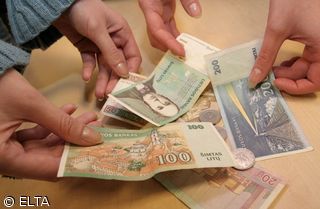The government will recommend a 3.5% inflation target for the end of 2006, Finance Minister Tibor Draskovics announced
Published:
1 November 2004 y., Monday
The Hungarian government will recommend a 3.5% inflation target for the end of 2006, Finance Minister Tibor Draskovics announced. Draskovics said annual inflation will be 6.8%–6.9% for 2004, and will continue to slow in 2005 to a yearly 4.5%. National Bank (MNB) President Zsigmond Jбrai said the 3.5% target for 2006 is feasible provided fiscal policy remains strict.
52.6% of revenue in the 2005 budget carries medium or high risk, the State Audit Office (БSz) found. The office said the government’s target for GDP growth of 4% in 2005 is realistic, but not without risk, and added that the general government deficit target of 4.7% of GDP is riskier. The office also said the 2005 budget is not detailed enough in its description of expenditures related to public-private partnerships (PPPs).
The government plans to present an alternative to an БSz proposal that would force it to make a new budget if the original’s targets are exceeded by 2.5%. The government proposes allowing a 5% overshoot of budget targets. Forcing the government to create a supplementary budget would mean the new budget has to be approved by Parliament.
The government issued Ђ1 billion in eurobonds, State Debt Management Rt (БKK) announced, saying it would use the issue to refinance debts maturing in 2004. The terms of the issue are the best of all government-issued eurobonds, the БKK press release stated. They mature in seven years, and pay annual fixed interest of 3.625%.
The government earmarked Ft 17 billion (Ђ69 million) for housing subsidies in next year’s budget. The budget includes a Ft 3.4 billion allocation for a new type of rent subsidy aimed at young people with few financial resources. Another Ft 4 billion is set aside for a fund providing state guarantees for housing loans.
Šaltinis:
bbj.hu
Copying, publishing, announcing any information from the News.lt portal without written permission of News.lt editorial office is prohibited.
The most popular articles
 According to the data presented by the Ministry of Finance, in end-January central government debt made up LTL26, 310.8 million or 28% of projected GDP for 2010 (LTL 93, 819 million).
more »
According to the data presented by the Ministry of Finance, in end-January central government debt made up LTL26, 310.8 million or 28% of projected GDP for 2010 (LTL 93, 819 million).
more »
 As far as countries affected by the economic crisis, China fared extremely well.
more »
As far as countries affected by the economic crisis, China fared extremely well.
more »
 The European Commission has authorised today a Slovak scheme with a budget of approximately €3.32 million which aims at supporting farmers in Slovakia who encounter difficulties as a result of the current economic crisis.
more »
The European Commission has authorised today a Slovak scheme with a budget of approximately €3.32 million which aims at supporting farmers in Slovakia who encounter difficulties as a result of the current economic crisis.
more »
 Commission sets out a 10-year strategy for reviving the European economy, casting a vision of ‘smart, sustainable, inclusive' growth rooted in greater coordination of national and European policy.
more »
Commission sets out a 10-year strategy for reviving the European economy, casting a vision of ‘smart, sustainable, inclusive' growth rooted in greater coordination of national and European policy.
more »
 The European Commission has launched today the Europe 2020 Strategy to go out of the crisis and prepare EU economy for the next decade. The Commission identifies three key drivers for growth, to be implemented through concrete actions at EU and national levels.
more »
The European Commission has launched today the Europe 2020 Strategy to go out of the crisis and prepare EU economy for the next decade. The Commission identifies three key drivers for growth, to be implemented through concrete actions at EU and national levels.
more »
 Launching of the “SCHOOLS’ initiative for innovation and changes” Grant scheme.
more »
Launching of the “SCHOOLS’ initiative for innovation and changes” Grant scheme.
more »
 EU Member States must not only deliver on their international aid pledges, but also bring in a financial transactions tax and a temporary debt moratorium, to help developing countries to cope with the effects of the global financial and economic crisis, said the Development Committee on Monday.
more »
EU Member States must not only deliver on their international aid pledges, but also bring in a financial transactions tax and a temporary debt moratorium, to help developing countries to cope with the effects of the global financial and economic crisis, said the Development Committee on Monday.
more »
 The EBRD is increasing its commitments to promote sustainable energy projects in Slovakia with a new €90 million funding under the existing Slovakia Sustainable Energy Finance Facility (SLOVSEFF) to ensure continuous implementation of energy efficiency and small renewable energy projects.
more »
The EBRD is increasing its commitments to promote sustainable energy projects in Slovakia with a new €90 million funding under the existing Slovakia Sustainable Energy Finance Facility (SLOVSEFF) to ensure continuous implementation of energy efficiency and small renewable energy projects.
more »
 According to the unaudited data, in 2009 AB Bank SNORAS earned LTL 8.7 million profit. The bank’s assets grew by 11 per cent up to LTL 6.342 billion during 2009 and were by LTL 647.8 million larger than at the beginning of 2009.
more »
According to the unaudited data, in 2009 AB Bank SNORAS earned LTL 8.7 million profit. The bank’s assets grew by 11 per cent up to LTL 6.342 billion during 2009 and were by LTL 647.8 million larger than at the beginning of 2009.
more »
 Aviation security measures that go beyond common EU requirements should be paid for by Member States, not by passengers, said Transport Committee MEPs in a vote on Monday that could put Parliament on a collision course with the Council of Ministers.
more »
Aviation security measures that go beyond common EU requirements should be paid for by Member States, not by passengers, said Transport Committee MEPs in a vote on Monday that could put Parliament on a collision course with the Council of Ministers.
more »